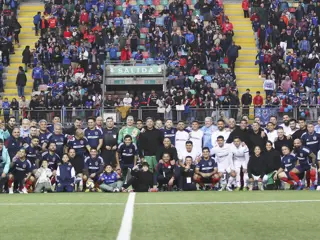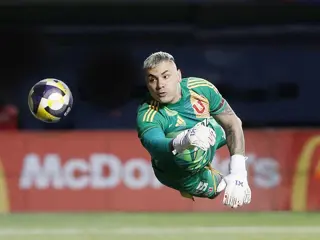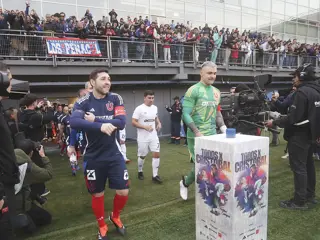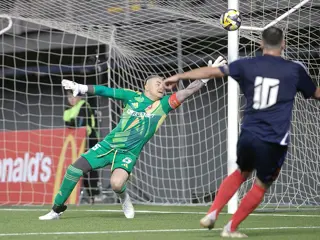Player Story
Cristobal Campos: "Mental health can no longer be a taboo subject in football"
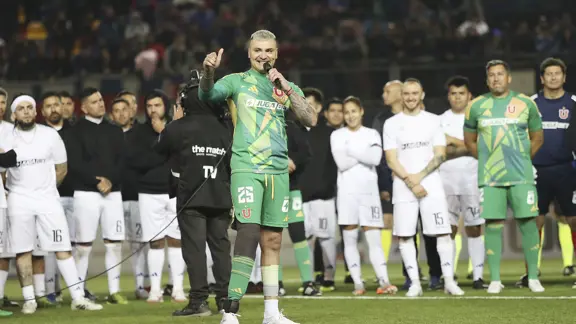
- The Chilean goalkeeper had his right foot amputated in 2024 after a serious car accident
- This year, before returning to the pitch to play a charity match, Campos revealed he was going through depression at the time of the crash
- Campos spoke to FIFPRO about his mental health, how well he is doing now, his desire to play again and the enormous help he received from Chilean player union Sifup
The following article contains mention of suicide, which some readers may find disturbing. If you have been affected by the topics raised in this article, please find materials and information that may support you as part of our Mental Health tool kit.
On 2 September 2024, Chilean football woke up to shocking news: Cristobal Campos, former goalkeeper for Universidad de Chile and the Chilean U-20 national team, and star player for San Antonio Unido in the country's second division, had been involved in a serious car accident. Hours later, it was confirmed that Campos' right foot would have to be amputated.
A few weeks ago, when it was already known that thanks to the use of a prosthesis he would be able to participate in a charity match alongside former team-mates and friends, Campos decided to publicly reveal the truth behind what until then seemed like an unfortunate accident for a 25-year-old professional footballer.
"I had been struggling with depression. I was on medication, and it was difficult for me. It was an emotional rollercoaster with the medication. There came a point when I couldn't control it anymore. In the accident, I attempted to take my own life."
The revelation once again highlighted the importance of mental health care in the world of football. In conversation with FIFPRO, with emotions still running high after returning to play in the charity match ‘Todos por Cristobal’ (Everyone for Cristobal), Campos delves into what that period before the crash was like.
"I have been dealing with depression for many years, which made me want to retire. There was a point in my life when football no longer made sense to me. I wasn't enjoying training or matches. But people didn't realise that because I projected a different image. I was in treatment with several psychologists and psychiatrists, but I wasn't consistent with my medication because I didn't feel like myself, especially when playing. I felt that the medication affected my performance on the pitch. It was complicated. Besides, mental health wasn't a topic that was talked about much at the time, so you didn't take the problem seriously."
Today, that view has changed radically: "I am in treatment and very aware that it is essential for me and my mental health. To this day, I have ups and downs; obviously, it is not an easy process. It involves understanding, assimilation, fatigue, sadness, disappointment. But also joy, because you see the results in all the progress I have made. I live day to day and little by little I have been setting myself longer-term goals. I try to be strong and focused on my recovery. I am 100 per cent committed to that."
Mental health: Are you ready to talk?
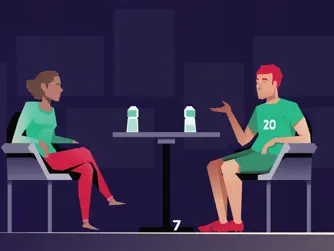
Making the true cause of the accident public is also part of that recovery: "I wanted to close the circle. A lot has been said about me as an act of resilience, that I am seen as an example. But the truth is that I am standing up now because I am taking responsibility for a bad decision I made. That's why I wanted to tell my story, so that people could see things as they are, that footballers are people, that we make mistakes and that we are not always as well as people think."
Raising awareness of the mental health struggles currently faced by footballers is one of FIFPRO's most pressing concerns; it is essential that mental health problems are diagnosed and treated correctly with the same commitment and attention as physical injuries. Campos believes it is important for footballers "not to be afraid to acknowledge it, to talk about it, because help is essential and must be provided in a timely manner. Mental health can no longer be a taboo subject in football."
His experience taught him that, without proper care, no amount of good news in sport can change the underlying problem. "I had approaches from Colo Colo and other top tier teams and from abroad. While it is true that this was positive news, when you are suffering from depression, even that kind of thing does not help enough. At that time, football did not fulfil me; the exposure caused me a lot of anxiety. It is very difficult to be happy."
Sifup, crucial support on road to recovery
20 June was an unforgettable day for Campos: 5,000 people flocked to the Bicentenario Stadium in Santiago de Chile to see him play again. Former U de Chile stars, such as Marcelo Salas, took on a team of the goalkeeper's friends in a charity match organised by Sifup, the Chilean players' union.
"It was a very special moment. The football pitch is my natural habitat, it's my place in the world, so I was very happy. The feeling of being back in the dressing room with my former team-mates, going out onto the pitch and receiving the ovation from the fans is an emotion I will never forget. I can say that I was very happy again. It was all very meaningful to me, and to this day it gives me a feeling of great joy and peace of mind."
Organising ‘Everyone for Cristobal’ was the way Sifup found to raise funds and cover a large part of the many expenses that the goalkeeper has had to face since he was forced to leave professional football. For example, hospital costs have been extremely high. Footballers, like any Chilean worker, allocate seven percent of their salary to health insurance. Playing in the second division, Campos' salary was not very high and the benefits he had access to were limited.
"Without the union, I don't know where I would be right now. They have supported me throughout my career and especially since I had the accident. They have given me support in every way and have supported my family."
The therapy Campos undergoes is part of the services provided to footballers under the agreement between Sifup and the MEDS medical centre. In addition, the union intervened to obtain the prosthesis that now allows him to walk, train and play matches like the one in June. "The board contacted the captains of Colo Colo, Universidad Catolica and La U, and between the three teams they raised the money to pay for half of my prosthesis. How could I not be proud of my country's footballers' union? Sifup and my fellow union members, as well as former footballers, have always been by my side."
The dream of playing again
The use of the prosthesis opened the doors to Ruca Mapu, the sports complex owned by the union. It was a fundamental step in his recovery process.
"Since I started training again at the Sifup complex with Luis Marin, I began to experience sensations and emotions that I had lost. It was an extra motivation in my daily life. I started setting new long- and short-term goals. In addition, returning to play and train has helped me a lot psychologically."
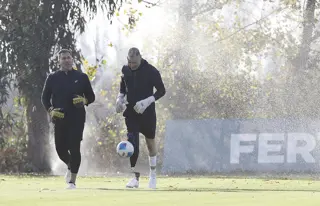
The name Luis Marin, treasurer of Sifup, is mentioned several times during the conversation. They met at Universidad de Chile when Marin was the first team's goalkeeper and Campos was already in the youth team at the age of 14.
"He has been the person who has helped me the most since I had the accident. From that moment on, we became much closer. A few months ago, I was in bed, I didn't want to get up, I didn't want to wear a prosthesis, I didn't want anything. Without him, I wouldn't be standing here today. He was there when I fell. I love him very much. We talk every day, he accompanies me to therapy, we train together, he helps me, and he also challenges me. He has become someone fundamental in my life."
Campos recently read the story of Martin Hofbauer, an Austrian footballer who lost his right leg to cancer and was authorised by FIFA in 2013 to play with a prosthesis in Austria's amateur Serie B.
"Between now and the end of the year, I've set myself the goal of playing again. I want to be happy on the pitch again. Hofbauer is the only case in the world. I've set myself the goal of becoming the first player in the Americas to achieve this."

